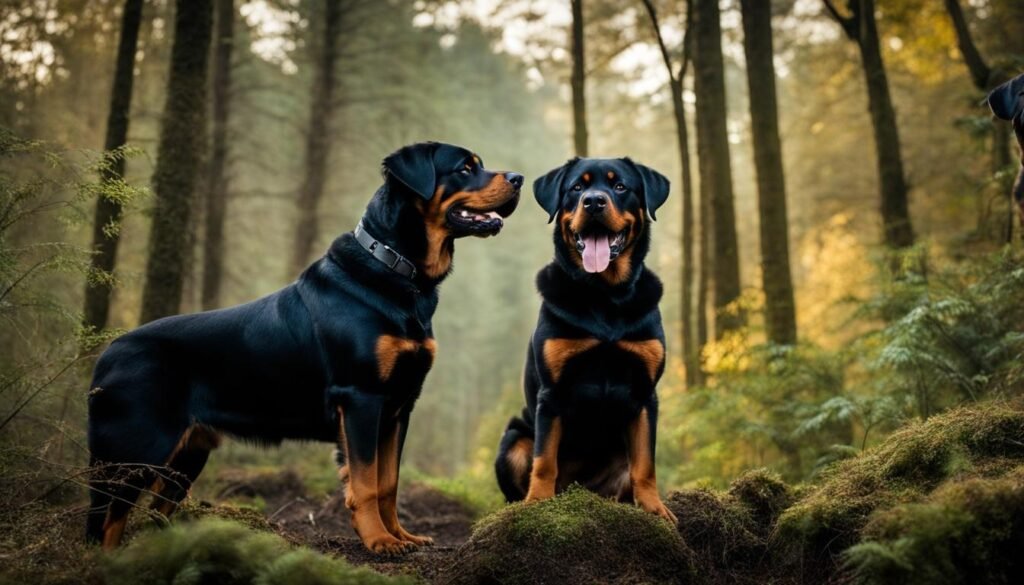When you think of hunting dogs, Rottweilers may not be the first breed that comes to mind. But as a seasoned hunter and dog enthusiast, I have seen firsthand the hunting abilities and potential of Rottweilers. In this article, I will delve into the qualities that make Rottweilers suitable for hunting and the training required to unleash their hunting instincts.
The Rottweiler breed, known for their strength and intelligence, may not have a strong hunting background historically. However, they possess a powerful prey drive and tracking abilities that, when properly trained, can make them proficient hunting companions. While they may lack some of the natural instincts of traditional hunting breeds, their adaptability and loyalty make them exceptional in the field.
If you’re considering hunting with Rottweilers, it’s crucial to understand their temperament and limitations. While they excel in areas such as tracking and endurance, their size and lack of a soft mouth for retrieving may pose challenges. Nonetheless, with the right training, socialization, and consistency, Rottweilers can become valuable assets in your hunting endeavors.
Join me as I explore the characteristics, training approaches, and potential of Rottweilers as hunting dogs. Discover how these remarkable companions can bring a new level of excitement and effectiveness to your hunting experiences.
Key Takeaways:
- Rottweilers have the necessary prey drive and tracking ability to be successful hunting dogs.
- While they may lack some natural hunting instincts, with proper training, Rottweilers can excel in the field.
- Their strength, intelligence, and adaptability make them well-suited for hunting.
- Consider their limitations in retrieving, swimming, size, and heat tolerance when using Rottweilers for hunting.
- Early training, socialization, obedience, and consistency are key to unlocking their hunting potential.
What Is A Hunting Dog Supposed To Do?
A hunting dog’s main responsibility is to track or retrieve game for hunters. Dogs use their keen sense of smell to track down prey and often retrieve it back to the hunter. This includes activities such as:
- Chasing and barking at scents
- Tracking and pointing out game
- Retrieving shot game from land or water
The ability to track and retrieve are key traits in a successful hunting dog. They are trained to follow scent trails left by the prey and locate it. Some dogs even have a natural instinct to “point” at the game, indicating its presence to the hunter. Retrieving dogs, on the other hand, excel at finding and bringing back shot game. They are typically trained to have a soft mouth, meaning they can pick up and carry game without damaging it.
Do Rotties Have A History Of Hunting?
While Rottweilers have a long history that dates back to ancient Rome, they were primarily used for herding, droving, and protecting cattle. Hunting was not their main role throughout history. However, Rottweilers do have a prey drive that can be traced back to their wolf ancestors, which can make them suitable for hunting purposes with the right training.
Despite not having a strong history of hunting, Rottweilers can still exhibit the necessary instincts and abilities to excel in the field. Their genetic connection to wolves gives them a natural prey drive, making them inclined to track and chase prey. Although they were not specifically bred for hunting unlike some other hunting dog breeds, Rottweilers possess traits that can be developed and honed for hunting with appropriate training.
While the ancestors of Rottweilers were primarily used for herding and droving cattle, their genetics and lineage can still benefit them in the hunting context. Rottweilers have a strong physical build, muscular stature, and inherent intelligence, which can contribute to their success as hunting dogs. These qualities, combined with the proper training and guidance, allow Rottweilers to consistently demonstrate their exceptional hunting abilities.
Rottweilers may not have a prominent historical background in hunting, but their inherent traits and characteristics make them adaptable to various tasks. With their keen senses, strength, and intelligence, Rottweilers can be trained to become effective hunting companions. Their wolf ancestry and instincts play a significant role in their hunting potential, which can be further honed through structured and consistent training methods.
What Makes Rotties Good Hunting Dogs?
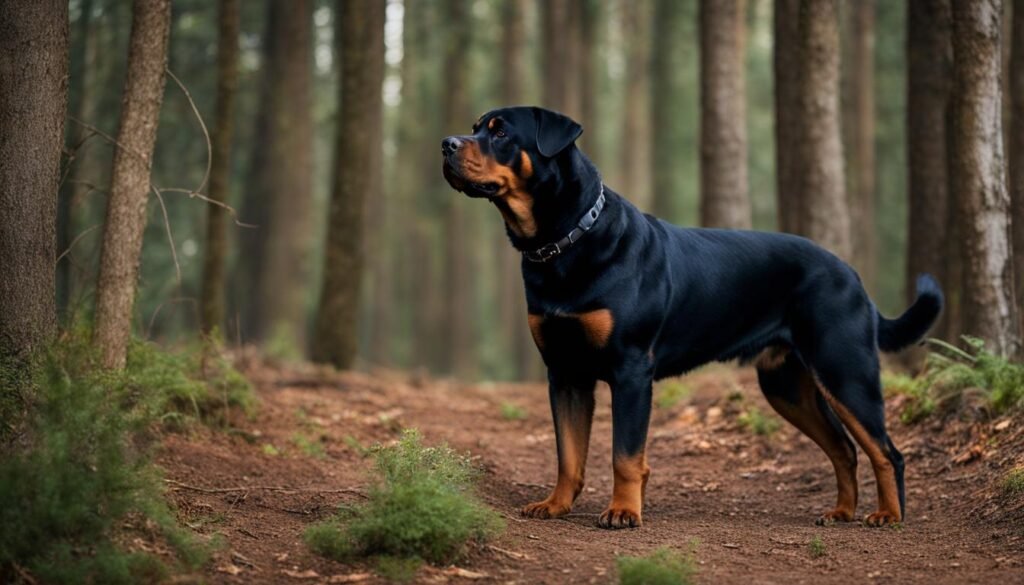
Despite not having a strong hunting background, Rottweilers possess certain qualities that make them well-suited for hunting.
Prey Drive: Rottweilers have a powerful prey drive, which is essential for hunting. This instinct drives them to pursue and track prey, making them highly motivated and focused in the field.
Strength: Rottweilers are known for their strength, making them capable of tackling larger game. Their muscular build and powerful physique enable them to endure physically demanding hunts.
Intelligence: Rottweilers are intelligent dogs that are quick learners and eager to please their owners. This trait translates well into hunting, as they can understand and follow commands effectively.
Tracking Abilities: Rottweilers have a natural inclination for tracking scents. Their keen sense of smell, combined with their determination, allows them to trail game efficiently in various terrains.
Double Coat: The Rottweiler’s double coat provides insulation in cold weather, making them adaptable to hunting in different environments. This feature ensures that they can withstand harsh conditions while remaining focused on the hunt.
Overall, while Rottweilers may not have a traditional hunting background, their prey drive, strength, intelligence, tracking abilities, and double coat make them well-equipped for the hunting field. With the right training and guidance, Rottweilers can become proficient hunting companions.
What Are Rotties Lacking When It Comes To Hunting?
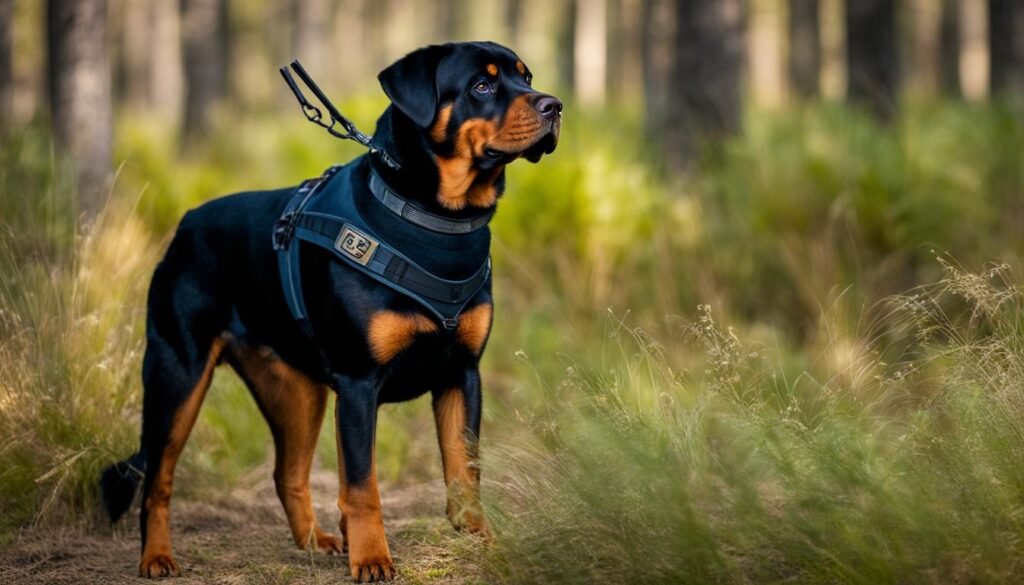
While Rottweilers have many qualities that make them suitable for hunting, there are a few limitations to consider. It’s important to be aware of these factors when considering Rottweilers as hunting dogs:
- Retrieving: Unlike retriever breeds, Rottweilers don’t possess a natural retrieving instinct. This may affect their ability to excel in this aspect of hunting.
- Soft Mouth: Rottweilers do not have a soft mouth, meaning they may unintentionally cause damage to game when retrieving it. This can be a drawback in hunting situations where the preservation of game is crucial.
- Size: Rottweilers are known for their substantial size and bulkiness, which can make them less agile compared to smaller hunting breeds. This lack of agility may impact their performance in certain hunting scenarios.
- Swimming: While Rottweilers can swim, they are not the strongest swimmers among the hunting dog breeds. They may struggle with long distances in the water, which can limit their effectiveness in hunting situations that involve swimming.
- Heat Tolerance: Rottweilers have a lower tolerance for heat due to their double coat. This can make them more susceptible to heat-related stress or discomfort in hot weather conditions, potentially affecting their performance and safety in the field.
Despite these limitations, Rottweilers can still be competent hunting companions with the right training and management strategies. It’s crucial to consider these factors and plan accordingly to maximize their potential in hunting scenarios.
Do Rottweilers Need To Be Trained Differently From Other Hunting Dogs?
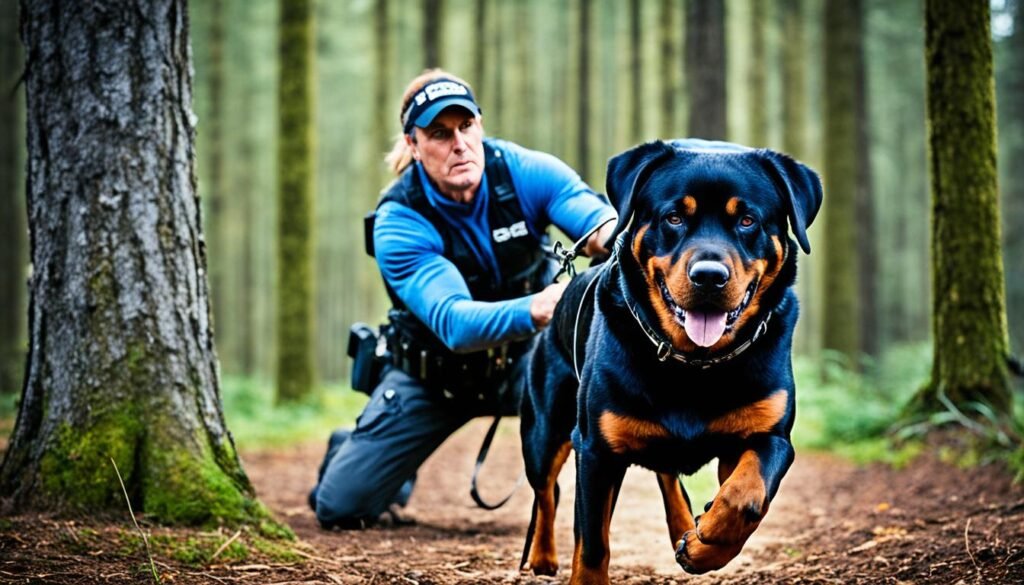
When it comes to training Rottweilers for hunting, the methods can be similar to those used for other hunting dogs. However, due to their lack of natural hunting instincts, Rottweilers may require some additional patience and consistent training to develop the desired hunting skills. It is crucial to focus on their prey drive, tracking abilities, and retrieving training in order to maximize their potential as hunting dogs.
Rottweilers are known for their strength, intelligence, and adaptability, which can be harnessed during their hunting training. However, their training should emphasize their specific strengths and compensate for their limitations in certain areas. By tailoring the training to their individual needs, Rottweilers can excel as effective hunting companions.
One key aspect to consider is the Rottweiler’s prey drive. Their natural instinct to chase and capture prey can be enhanced through targeted training exercises. Using toys or scents that mimic the scent of game can help stimulate their prey drive and encourage them to actively engage in hunting activities.
Additionally, focusing on their tracking abilities is essential. Rottweilers have a strong sense of smell and can be trained to track scents over varying terrains. Introducing them to different scent trails and teaching them to follow the scent cues can improve their tracking skills and enhance their hunting capabilities.
Retrieving training is also important, although it may require more effort compared to breeds with a natural retrieving instinct. Using positive reinforcement and rewards, Rottweilers can be trained to retrieve game effectively. It is crucial to be patient and consistent during this training to develop their retrieving skills over time.
In conclusion, while Rottweilers can be trained similarly to other hunting dogs, their specific characteristics and developments may require some additional attention. By focusing on their prey drive, tracking abilities, and retrieving training, Rottweilers can overcome their limitations and become skilled hunting companions.
Rottweiler Temperament and Hunting
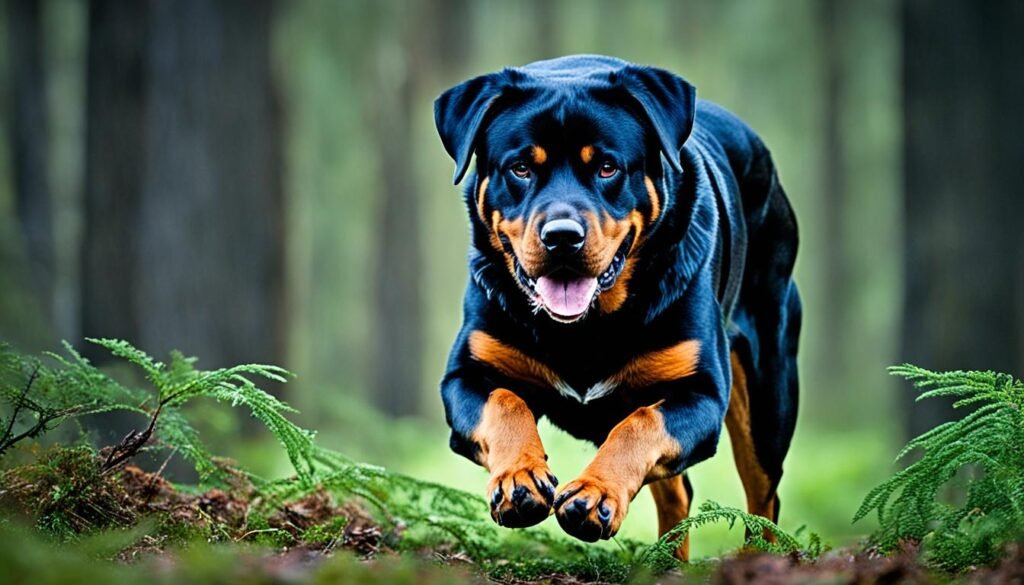
Rottweilers are known for their loyalty, confidence, and guarding instincts, which make them ideal for hunting. Their protective nature and trainable temperament make them dedicated hunting companions. The loyalty of a Rottweiler is unparalleled, ensuring they stay focused and committed to the task at hand.
Confidence is another key trait exhibited by Rottweilers, which is essential when facing challenging hunting situations. Their self-assured nature allows them to stay calm and composed even in high-pressure scenarios, making them reliable partners in the field.
In addition to their loyalty and confidence, Rottweilers have a natural guarding instinct. This instinct can be advantageous during hunting, as they are naturally alert to their surroundings and will actively protect their human companions and the hunted game.
However, it is crucial to note that while their guarding instincts can enhance their utility as hunting dogs, proper socialization and training are essential. It is important to expose Rottweilers to various hunting environments, other dogs, and people from an early age to prevent any aggression or territorial behavior. This ensures that they remain focused on the hunt and maintain good behavior with fellow dogs and hunters.
Overall, the temperament of Rottweilers, characterized by loyalty, confidence, and guarding instinct, makes them an excellent choice for hunting. Their protective nature combined with their trainable temperament creates a reliable and dedicated hunting companion.
Rottweiler Temperament and Hunting: Key Points
- Rottweilers exhibit loyalty, confidence, and guarding instincts, making them ideal hunting partners.
- Their loyalty ensures they stay committed and focused throughout the hunting process.
- Confidence is crucial for hunting, allowing Rottweilers to remain calm and collected in challenging situations.
- Their natural guarding instinct enhances their utility as hunting dogs by protecting their human companions and the hunted game.
- Proper socialization and training are necessary to prevent aggression or territorial behavior.
Rottweiler Training Tips for Hunting
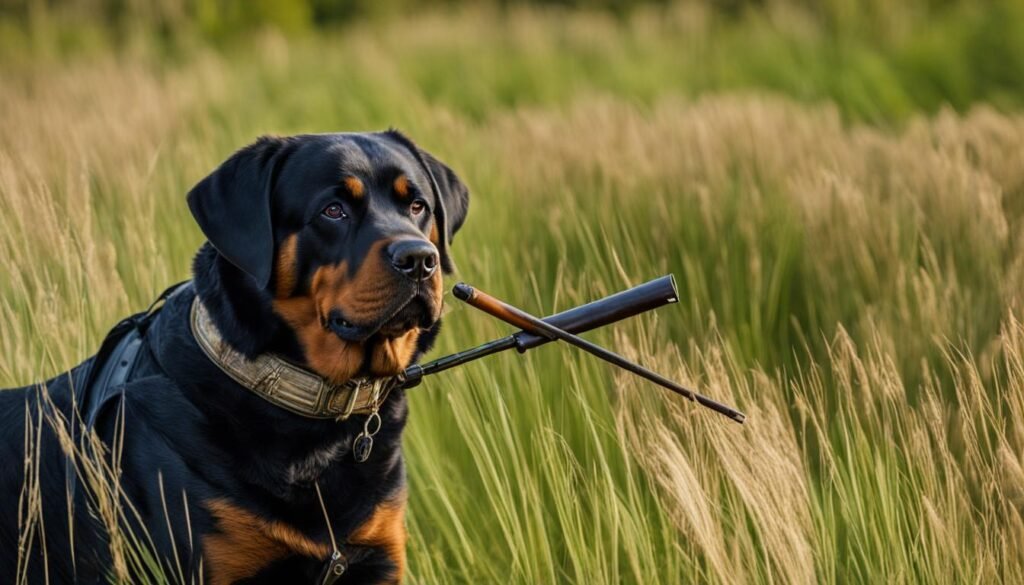
When training a Rottweiler for hunting, I emphasize the importance of starting early and focusing on socialization, obedience, and consistency. Early exposure to different hunting environments, people, and other animals can help Rottweilers develop the necessary skills and behavior for successful hunting.
Obedience training plays a crucial role in ensuring that Rottweilers follow commands during critical moments in the field. By teaching them basic commands such as sit, stay, come, and heel, they can be better controlled and directed during hunting activities. This training also instills discipline and strengthens the bond between the dog and the handler.
Consistency in training methods is key to shaping a Rottweiler’s hunting abilities. Establishing a routine and sticking to it helps in reinforcing desired behaviors and preventing confusion. It is important to use positive reinforcement techniques, such as rewards and praise, to motivate and encourage the dog.
During the training process, it is beneficial to incorporate simulated hunting scenarios and exercises. This can include setting up scent trails for the Rottweiler to track, practicing retrieving exercises with dummy game, and exposing them to different terrains and weather conditions. These activities help develop their tracking and retrieving skills, while also building their confidence in various hunting situations.
Additionally, socialization is an integral part of training Rottweilers for hunting. Gradually introducing them to other dogs, animals, and people in controlled environments helps them become more comfortable and less reactive. This ensures that they can work alongside other hunting dogs and follow commands without distraction.
In summary, when training a Rottweiler for hunting, it is crucial to start early, focus on socialization, obedience, and consistency. By providing early exposure to hunting environments, emphasizing obedience training, maintaining consistency, and incorporating simulated hunting activities, Rottweilers can develop into skilled and reliable hunting companions.
Conclusion
In conclusion, while Rottweilers may not be the typical choice for hunting dogs, they possess many qualities that make them suitable for hunting with the right training and guidance. Their strong prey drive, intelligence, and adaptability to different weather conditions make them potential candidates for hunting companions. However, it is important to consider their limitations in areas such as retrieving, swimming, size, and heat tolerance.
With proper training, socialization, and consistency, Rottweilers can overcome these limitations and become proficient hunting partners. By focusing on their prey drive, tracking abilities, and obedience training, owners can unlock the full potential of Rottweilers as hunting dogs. It is essential to instill discipline and reinforce positive behaviors to enhance their hunting instinct and ensure their safety in the field.
In conclusion, Rottweilers can be good hunting dogs, but they require dedicated training and ongoing guidance to develop their hunting skills effectively. By recognizing their strengths and limitations and tailoring their training accordingly, owners can enjoy the benefits of hunting with Rottweilers and witness their remarkable abilities in action.
FAQ
What is a hunting dog supposed to do?
A hunting dog’s main responsibility is to track or retrieve game for hunters. They use their keen sense of smell to track down prey and often retrieve it back to the hunter.
Do Rotties have a history of hunting?
While Rottweilers have a long history that dates back to ancient Rome, hunting was not their main role throughout history. They were primarily used for herding, droving, and protecting cattle.
What makes Rotties good hunting dogs?
Rottweilers possess qualities such as a powerful prey drive, strength, intelligence, tracking abilities, and adaptability to different weather conditions, which make them suitable for hunting.
What are Rotties lacking when it comes to hunting?
Rottweilers may not excel in retrieving as they lack the natural retrieving instinct that retriever breeds possess. They also do not have a soft mouth and may struggle with swimming and heat tolerance due to their size and double coat.
Do Rottweilers need to be trained differently from other hunting dogs?
Rottweilers can be trained similarly to other hunting dogs, but due to their lack of natural hunting instincts, they may require additional patience and consistent training to develop the desired hunting skills.
What is the temperament of Rottweilers when it comes to hunting?
Rottweilers are known for their loyalty, confidence, and guarding instincts, which can be beneficial in a hunting context. However, proper socialization and training are essential to prevent aggression or territorial behavior.
What are some Rottweiler training tips for hunting?
When training a Rottweiler for hunting, it is important to start early and focus on socialization, obedience, and consistency. Early exposure to different hunting environments, people, and animals can help develop the necessary skills and behavior for successful hunting.
Are Rottweilers good hunting dogs?
While Rottweilers may not be the typical choice for hunting dogs, they can still be successful in the field with the right training and guidance. Their prey drive, strength, intelligence, tracking abilities, and adaptability to different weather conditions make them suitable for hunting.
